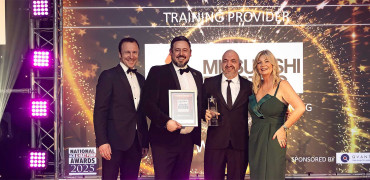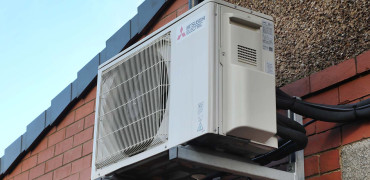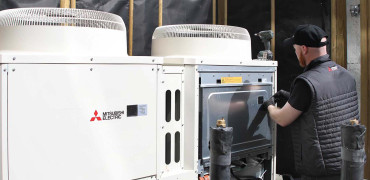Did you see the recent Government announcement of another £940 million for Phase 4 of the Public Sector Decarbonisation Fund – which is designed to help Local Authorities remove gas heating from their buildings?
Since 2020 the Fund has made over £3.6 billion available to help decarbonise schools, libraries, town halls and other public buildings, and this has led to many examples of gas heating being replaced with low carbon renewable heating and hot water systems.
That is a lot of work for the HVAC sector and a clear sign that we really are very near the end of gas as the nation’s dominant form of heating.
The route to market for our commercial heating is the same as for air conditioning
An all electric society
Whatever your views on renewables and gas, the direction of travel is towards the electrification of society, and this places the HVAC industry right at the front of the transition, presenting a significant opportunity for heat pump installers over the next 5-10 years.
Changes in the F-Gas Regulations and new refrigerants are bringing a bit of uncertainty to the world of air conditioning but companies that look to embrace heat pump technology for heating and hot water can end up with a much more sustainable business model.
Whist I’m pleased to say that awareness of heat pumps has increased somewhat over the past few years, there is still much to be done. And one thing that continues to surprise me is how many people still think heat pumps are just for houses!
Surely the money going into the Public Sector Decarbonisation Fund shows the potential for ‘non-domestic’ buildings?
What an opportunity
On the residential front, there are around 1.6m gas boilers sold each year, which contrasts sharply with the 70-80k heat pumps sold in 2024. So, domestically, there is huge opportunity to grow domestic heat pumps sales, if that is where you would like to focus your business.
Commercially though, I firmly believe that there are significant opportunities that are much more readily achievable and offer significant quick wins in terms of both business growth and carbon reduction.
Around 35,000 heat generating products are sold for commercial buildings annually, offering significant growth opportunities for heat pumps – and lots of work for the installation companies involved.
It’s worth bearing in mind that the route to market for our commercial heating products is the same as the route for air conditioning systems, making things somewhat easier.
Two driving factors
The adoption of commercial heat pumps is also outpacing the residential market, with two factors driving the conversion from gas to heat pumps:
Firstly, as mentioned above, over the past four to five years, the Public Sector Decarbonisation Scheme (also known as SALIX) has been quietly helping with the removal of gas from council buildings and its replacement with heat pumps.
Secondly, global investment is demanding buildings that will be sellable, or lettable into the future, and this is changing the requirement for new-build properties along with the retrofit sector.
Put simply, your clients will not get finance for their project or find tenants for their office block, unless they can demonstrate they have a building that will comply with future energy and carbon emissions requirements.
Room for growth
The commercial sector's gas consumption in England and Wales has remained fairly flat since 2012 with an approximate 2.5% reduction down to 156TWh according to the UK Government's Non-Domestic National Energy Efficiency Data Framework (up to the end of 2022).
There are over 2 million ‘non-domestic’ buildings in the UK and they are responsible for around 18% of the UK’s carbon emissions. That means there are a heck of a lot of commercial properties still using gas that need help to transition to electric heating over the next five to ten years.
For those already involved in the HVAC sector, this presents a fantastic opportunity to add heating skills and develop a truly sustainable business.
Ben Bartle-Ross is a technical trainer at Mitsubishi Electric




